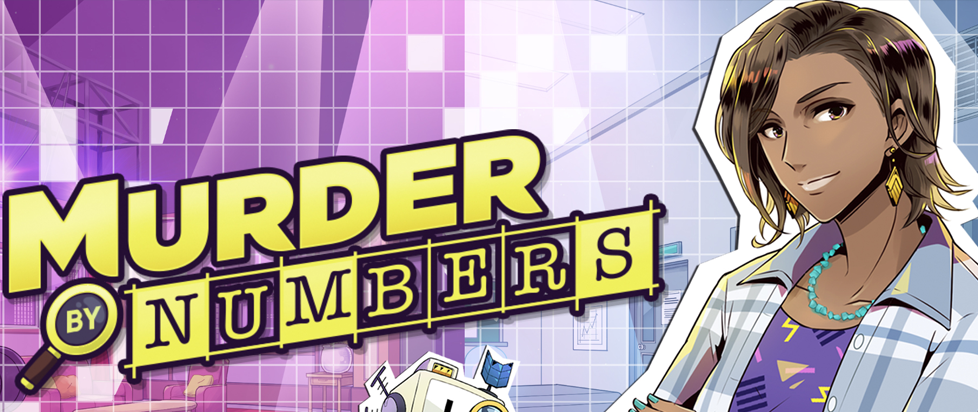
Murder By Numbers’ Thorny Queer Politics
Murder By Numbers brings something different to the table: It’s a crime visual novel in the style of Phoenix Wright, but instead of presenting evidence at trials, most of the interactive element of the game takes place in discrete picross puzzles. But dig deeper than the initial premise and you’ll find a game that not only dabbles in queerness, but fully includes it in its world, a move that’s frankly amazing by video games’ low standards when it comes to even acknowledging queerness exists. The game not only includes one queer character, but several, and one of the cases even revolves around one big aspect of queer culture. It’s clear that the developers want to be as inclusive as possible in their narrative, and to some degree, they succeed beyond what most games attempt. But there’s still complications that hold the game back from being truly inclusive, aspects of the story that might not be immediately apparent at first blush.
The game introduces you to a queer character almost immediately, and he immediately starts setting off alarm bells. Dubbed K.C., he’s the stylist for main character Honor Mizrahi’s TV show, and the first couple of lines he spouts are thirsty flirting with a buff handyman who happens to be in the room with him. The fears that arise from this first impression are immediately apparent to anyone who’s had to put up with stereotypes of gay men: that they’re feminine and horny bordering on predatory. K.C.’s immediate flirtatiousness threatens to define him as a character, which makes it unfortunate that the writers chose to lead with that combination of qualities for introducing him.
Thankfully, that’s not all there is to K.C. He quickly proves himself to be a fiercely loyal friend who’s very protective of his friends. On multiple occasions, he stands up to Honor’s abusive ex-husband when he tries to manipulate or berate her. This characteristic isn’t purely portrayed as a virtue, though, as he goes to bat for a person who turns out to be the guilty party in one of the cases. This wrinkle in his personality complicates what could easily have been a cardboard cutout of a character, making him feel like more of a real person. And when you’re a queer video game fan, that’s really all we can ask for.
But Murder By Numbers doesn’t stop there. Its third case revolves around a gay bar and has you interviewing multiple drag queens. But instead of falling into the trap of turning up the camp factor and making them stereotypes, they’re mostly all business while getting to display their individual personalities. Owner Fran, who arrives fully in drag, is cast as the responsible type who just wants her business to thrive and stay open, while bio queen Roz has a bigger-than-life personality even outside of shows and can be a hothead. Sidekick robot SCOUT even gets in on the questioning, as they vocally wonder why people refer to them as “him” when they haven’t really thought about gender themselves. Though it would have been nice for the game to have not limited their queer inclusion to gay male culture, overall Murder By Numbers largely treats the subject matter with respect, which is more than you can say for a lot of games.
But there’s still issues that hold the game back from being truly inclusive. Early in the gay bar investigation, the gender of a person becomes a key fact in the case for a brief moment, which harkens back to transphobic gotcha moments as seen in games like Phoenix Wright and Danganronpa. In these moments, a person’s gender is treated as false or used to trick the player into coming to the wrong conclusions, reducing the character in the process. Murder By Numbers doesn’t entirely fall into this trap, as it moves on quickly from this trope once it becomes unimportant. But the fact that it is a trope means it should have been avoided all together. As well, making one of the drag queens the perpetrator in the case is wearying, as having a queer character be the antagonist is well worn territory at this point, and being treated as such gets tiring. At least here, Fran isn’t just a cold-blooded murderer, but rather an accidental killer as she drives a parade float into her business to get insurance money to pay off a dangerous loan shark that’s threatening her. It’s nice to have a gay antagonist be truly sympathetic, but again, having the gay guy be the bad guy gets old.
And then there’s the elephant in the room that’s somehow easy to miss if you don’t know queer history: the relationship between queer institutions and abuse at the hands of police. You as Honor Mizrahi must search for clues in every crime scene you find yourself in. Sometimes that involves breaking into places you shouldn’t, though it’s all glossed over as okay if you find the truth. But this approach harkens to the constant denial of due process queer spaces must constantly endure at the hands of police. It’s why the Stonewall riots happened, and even continues to this day in queer spaces because the legal system is purposely stacked against queer people, especially trans people of color. That due process is swept under the rug in service of a more cheerful narrative is an alarming oversight for a game that wants to be inclusive of all things queer.
Still, at least developers Mediatonic are trying to invite queer people in, and that’s more than most can say. Murder By Numbers features several glaring holes in its attempt at inclusivity, it’s true. But even with these oversights, what the game does right still accomplishes something important: makes us feel seen. That alone is huge. Let’s just hope that developers continue learning to make us feel fully respected as well.





